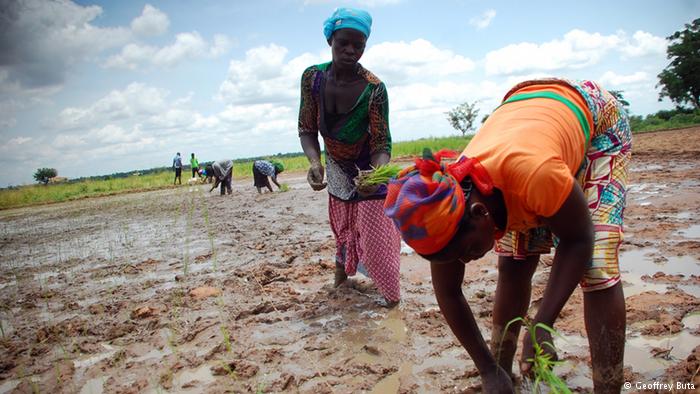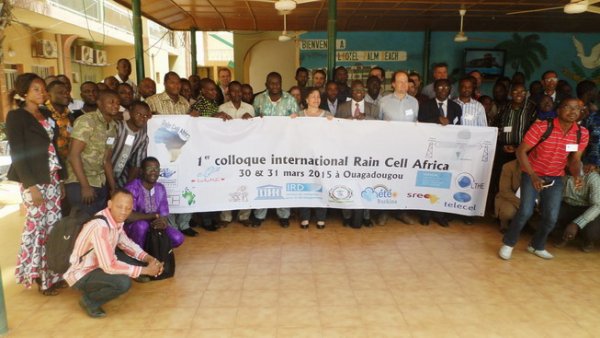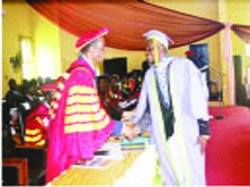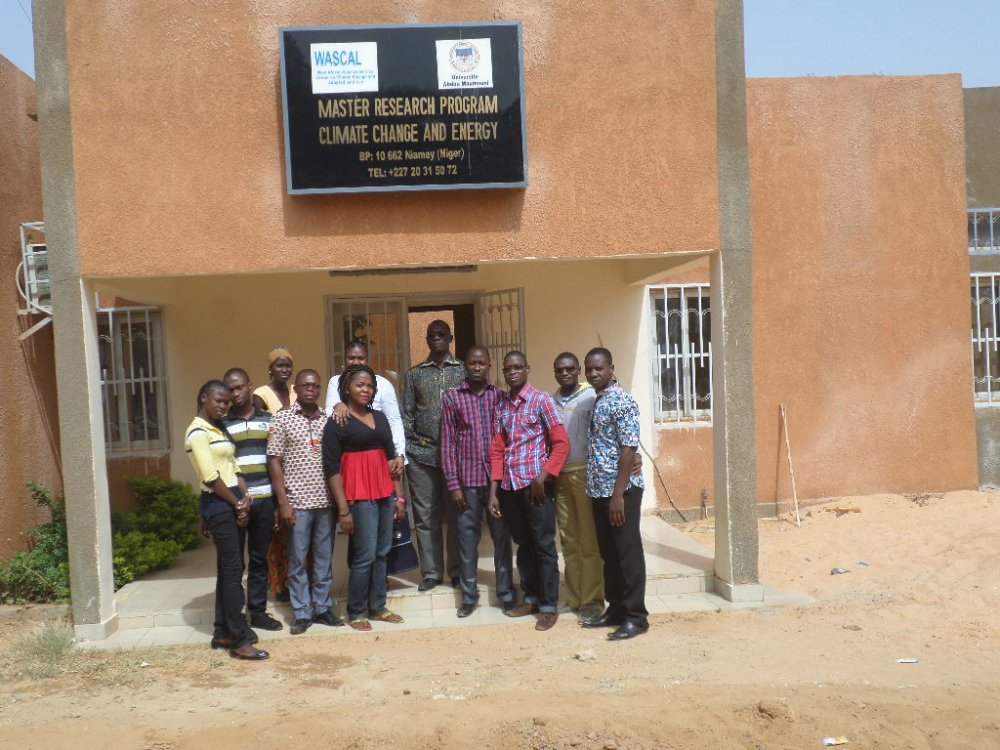Die Wetterextreme sind südlich des Äquators besonders spürbar. Dafür verantwortlich sind hauptsächlich die Industriestaaten. Forscher aus Afrika und Deutschland untersuchen die Veränderungen.
Tobias Wuenscher ist Wirtschaftswissenschaftler am Zentrum für Entwicklungsforschung (ZEF) der Uni Bonn. Doch selten sitzt Wuenscher an seinem Schreibtisch. Oft ist er im Auftrag von Wascal unterwegs: Das “West African Science service center on Climate change and Adapted Land use” ist ein Netzwerk von deutschen und afrikanischen Wissenschaftlern, das im Auftrag des Bundesforschungsministeriums agiert und in Ghanas Haupstadt Accra ein eigenes Zentrum hat. 56 Millionen Euro hat der Bund dafür bereitgestellt. Deutschland kommt mit Projekten wie Wascal seiner Verpflichtung nach, Entwicklungsländer bei der Anpassung an den Klimawandel zu unterstützen.
Wuenscher beschäftigt sich mit landwirtschaftlichen Innovationen und fördert diese: “Es gibt Landwirte, die selbst Ideen entwickeln, dem Klimawandel zu begegnen, die sie aber nicht an die große Glocke hängen.” Denn Not macht bekanntlich erfinderisch. Und viele Landwirte in Benin, Burkina Faso, Elfenbeinküste, Gambia, Ghana, Mali, Niger, Nigeria, Senegal und Togo sind in Not geraten, weil sich die Regenzeit verkürzt, die Temperaturen ansteigen und Trockenperioden verlängern. Die Bauern und ihre Familien spüren das an den leeren Mägen: “Die Menschen essen nur noch eine Mahlzeit am Tag, besonders außerhalb der Erntezeit. Fleisch gibt es selten. Obst und Gemüse sind teuer. Die Leute leben am Existenzminimum. Es geht um Leben und Tod”, hat Wuenscher erfahren.
Wissenstransfer durch Innovationswettbewerb
Heftige Winde zerstören Strohdächer und ganze Häuser, Hochwasser und veränderte Wetterperioden wirken sich nachhaltig schädlich auf Aussaat und Ernte aus. Wuenscher befragt Bauern, und er hat einen Trailer entwickelt, der in afrikanischen Radiosendern abgespielt wird. Darin werden die Landwirte aufgefordert, ihre eigenen Strategien kundzutun. Dem Wissenschaftler geht es um Wissenstransfer. Er will eine Basis schaffen, um Konzepte für die Landnutzung zu entwickeln und diese einem breiten Anwenderkreis zu vermitteln. Den Einsendern winken Motorräder, Wasserpumpen oder Baumaterialien als Belohnung. “Ein solarbetriebener Brutkasten zum schnelleren Ausbrüten von Eiern wurde so entdeckt. Aber meistens sind es phytomedizinische (Anm. d. Red.: “pflanzenmedizinische”) Methoden für Tiere oder Böden, die die Erfinder weitergeben.”
Wuenschers Erkenntnis: Die Produktivität werde nicht genügend ausgeschöpft. Der Klimawandel stelle eine zusätzliche Herausforderung dar. Andererseits würden die Menschen die Natur sehr genau beobachten. Dabei entdeckten sie Rinden, Wurzeln und Früchte, die sie zur Behandlung ausprobieren. Ein Landwirt habe berichtet, wie er mit Zwiebelblättern, die er auf seinem Acker verteile, Striga – ein aggressives, lippenblütlerartiges Unkraut – zurückdrängen konnte.
Ein anderer Bauer habe die Erkenntnis gewonnen, dass er seine Schweine mit Wurzeln erfolgreich gegen das Virus der afrikanischen Schweinepest behandelt habe. “Es wäre eine kleine Sensation, wenn diese Methode funktionieren würde. Wir müssen die Vorschläge natürlich alle auf ihre Wirksamkeit wissenschaftlich überprüfen”, sagt Tobias Wuenscher.
Regionale Unterschiede in Bezug auf den Klimawandel
Besonders deutlich sind die Folgen des Klimawandels in seiner Heimat, dem Norden Ghanas, zu beobachten, erzählt Stephen A. Adaawen: Schwere Dürren und Überschwemmungen, erhöhte Temperaturen und deren Folgen machen Menschen, Tieren und der Umwelt zu schaffen. Männer und Frauen, die gleichermaßen von der Landwirtschaft gelebt haben, werden arbeitslos. Andere Erwerbsmöglichkeiten gibt es aber nicht. Schlechte Ernährung bedingen Krankheiten, Epidemien und Konflikte. Weil das Überleben in der einstigen Kornkammer so schwierig geworden sei, entschieden sich viele Bewohner zur Migration:
“Sie bleiben nicht mehr nur periodisch weg, um Arbeitsausfälle zu überbrücken, sondern verlassen ihre Heimat auf Dauer und ziehen in den urbanen Süden des Landes, um in Goldminen oder auf Kakaoplantagen Arbeit zu finden, oder in andere fruchtbarere Regionen”, sagt Adaawen. Er hat die durch den Klimawandel bedingte Migration untersucht: “Aber an den neuen Orten haben sie nicht automatisch Zugang zu Land. Es ist ein Teufelskreis.”
“Der Klimawandel macht die Erfindung von trockenheitsresistenterem Saatgut und schnellwachsenderen Nutzpflanzenarten nötig, die wegen der verkürzten und heftigeren Regenperiode in Kürze reifen könnten”, fügt Jan-Niklas Bamler hinzu, der die Produktivität in Nordghana untersuchte. Hirse oder Erdnüsse, traditionelle Feldfrüchte und indigenes Saatgut können sich an die widrigen Witterungsbedingungen besser anpassen als Mais, Reis, Tomaten oder Chilis, die dort traditionell nicht angebaut wurden. Außerdem benötigten sie Dünger und Pestizide, die sich viele Bauern nicht leisten könnten. Düngemittel, die von Hilfeorganisationen zur Verfügung gestellt würden, seien nicht nachhaltig, für die Böden ungeeignet oder würden von korrupten Eliten außer Landes geschmuggelt, ehe sie die Bedürftigen erreichten, sagen beide Wissenschaftler.
Die Redaktion empfiehlt
Shiweda: “Der Klimawandel kennt keine Grenzen”
Deutschland erforscht gemeinsam mit afrikanischen Staaten den Klimawandel. Davon profitieren beide Seiten, glaubt Anna Shiweda, Vize-Direktorin eines multinationalen Forschungszentrums in Namibia. (20.03.2014)
Deutsch-afrikanische Klimaschutz-Zentren
Kein Erfolg mit Tomatenanbau
“Von Tomaten kann sich auf Dauer niemand ernähren, außerdem sind sie nur eine Woche nach der Ernte verdorben. Das Produkt eignet sich nur für den Verkauf. Dazu benötigten die Bauern einen schnellen Marktzugang”, sagt Bamler. “Auch gab es mal eine Fabrik, die Tomatenmark produzierte, weil es in Ghana zu fast jedem Gericht gehört, aber sie war nur ein Geschenk der Politiker. Es bestand aber kein Interesse daran, dort zu produzieren. Auch eigneten sich die Tomaten aus der Region qualitativ nicht für Tomatenmark. So muss die ohnehin preiswertere – weil subventionierte – Paste aus Italien importiert werden.”
Zehn Monate hat Bamler in Ghana verbracht. Bei seinen Untersuchungen hat er auch festgestellt, dass Entwicklungshilfe oft nur wenigen zugute komme. Jetzt schreibt er seine Doktorarbeit über seine Erkenntnisse. “Ich hoffe, dass sie eine breitere Öffentlichkeit erreichen.”
Sein Vater hat nach einem Besuch beschlossen, eine Schule zu bauen. Und auch Wascal fördert die Bildung durch ein Graduiertenprogramm. Die ersten zehn Doktoranden wurden in Accra bereits verabschiedet.
WWW-Links
WASCAL
Datum 09.04.2015
Autorin/Autor Karin Jäger
Themenseiten Klimawandel
Schlagwörter Umwelt, Klimawandel, Wascal, Uni Bonn, Zentrum für Entwicklungsforschung (ZEF)
Feedback: Schreiben Sie uns!
Drucken Seite drucken
Permalink https://p.dw.com/p/1F4Bd






